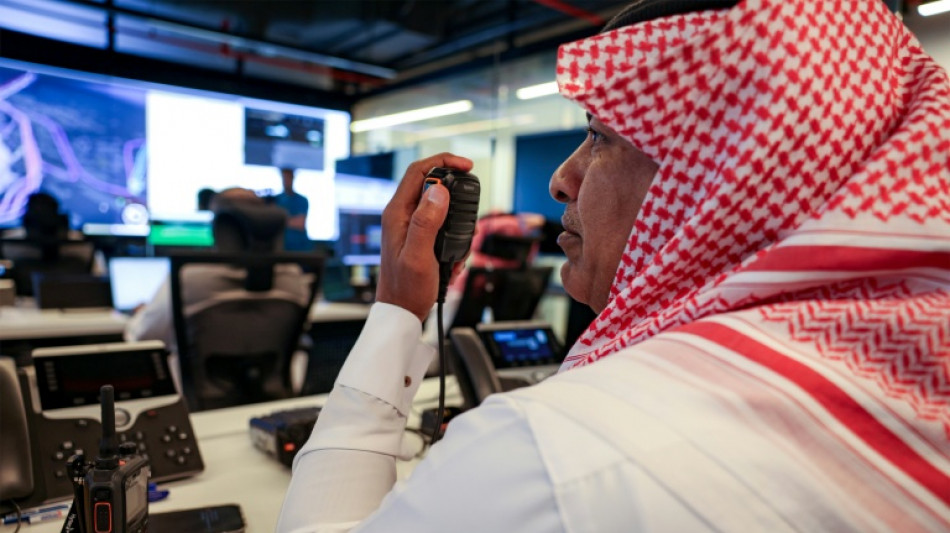
-
 M23, DR Congo sign new peace roadmap in Doha
M23, DR Congo sign new peace roadmap in Doha
-
Estevao, Casemiro on target for Brazil in Senegal win

-
 Ford steers England to rare win over New Zealand
Ford steers England to rare win over New Zealand
-
Massive march in Brazil marks first big UN climate protest in years

-
 Spain rescues hundreds of exotic animals from unlicensed shelter
Spain rescues hundreds of exotic animals from unlicensed shelter
-
Huge fire sparked by explosions near Argentine capital 'contained'

-
 South Africa defy early red card to beat battling Italy
South Africa defy early red card to beat battling Italy
-
Sinner beats De Minaur to reach ATP Finals title match

-
 Zelensky vows overhaul of Ukraine's scandal-hit energy firms
Zelensky vows overhaul of Ukraine's scandal-hit energy firms
-
South Africa defy early red card to beat Italy

-
 Alex Marquez claims Valencia MotoGP sprint victory
Alex Marquez claims Valencia MotoGP sprint victory
-
McIlroy shares lead with Race to Dubai title in sight

-
 Climate protesters rally in Brazil at COP30 halfway mark
Climate protesters rally in Brazil at COP30 halfway mark
-
Spike Lee gifts pope Knicks jersey as pontiff meets film stars

-
 BBC caught in crossfire of polarised political and media landscape
BBC caught in crossfire of polarised political and media landscape
-
'Happy' Shiffrin dominates in Levi slalom for 102nd World Cup win

-
 Palestinian national team on 'mission' for peace in Spain visit
Palestinian national team on 'mission' for peace in Spain visit
-
Brazilian 'Superman' cheers child cancer patients in Ghana

-
 India close in on win over South Africa after Jadeja heroics
India close in on win over South Africa after Jadeja heroics
-
Huge explosions rock industrial area near Argentina's capital

-
 Bezzecchi takes pole for Valencia sprint and MotoGP
Bezzecchi takes pole for Valencia sprint and MotoGP
-
Dominant Shiffrin leads after first slalom run in Levi

-
 Nine killed in accidental explosion at Indian Kashmir police station
Nine killed in accidental explosion at Indian Kashmir police station
-
Climate protesters to rally at COP30's halfway mark

-
 Fighting South Africa lose Rickelton after India 189 all out
Fighting South Africa lose Rickelton after India 189 all out
-
Harmer leads South Africa fightback as India 189 all out

-
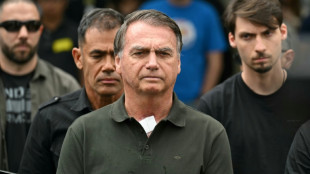 Prison looms for Brazil's Bolsonaro after court rejects his appeal
Prison looms for Brazil's Bolsonaro after court rejects his appeal
-
EU bows to pressure on loosening AI, privacy rules
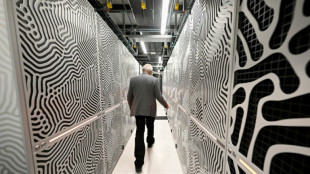
-
 India close in on lead despite South African strikes
India close in on lead despite South African strikes
-
Curry's 49 points propel Warriors in 109-108 win over Spurs

-
 NZ boxer Parker denies taking banned substance after failed test
NZ boxer Parker denies taking banned substance after failed test
-
Australia setback as Hazlewood ruled out of 1st Ashes Test

-
 Australia pace spearhead Josh Hazlewood ruled out of 1st Ashes Test
Australia pace spearhead Josh Hazlewood ruled out of 1st Ashes Test
-
UN Security Council to vote Monday on Trump Gaza plan
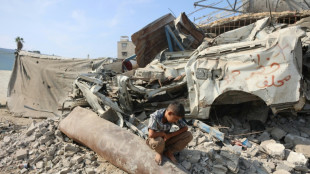
-
 Japan's Tomono leads after men's short program at Skate America
Japan's Tomono leads after men's short program at Skate America
-
China tells citizens to avoid Japan travel as Taiwan row grows
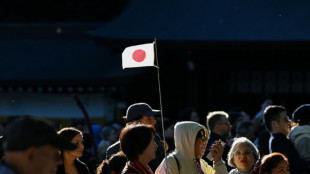
-
 Purdue Pharma to be dissolved as US judge says to approve bankruptcy
Purdue Pharma to be dissolved as US judge says to approve bankruptcy
-
Iran's first woman orchestra conductor inspires

-
 Wood gets all-clear in boost for England
Wood gets all-clear in boost for England
-
Golf's world No. 8 Thomas has back surgery

-
 Rebooted Harlem museum celebrates rise of Black art
Rebooted Harlem museum celebrates rise of Black art
-
'Desperation in the air': immigrant comics skewer Trump crackdown

-
 UN regulator says shipping still wants to decarbonize -- despite US threats
UN regulator says shipping still wants to decarbonize -- despite US threats
-
Grant, Kim share halfway lead in LPGA Annika tournament

-
 Musk's Grokipedia leans on 'questionable' sources, study says
Musk's Grokipedia leans on 'questionable' sources, study says
-
Trump signs order to lower tariffs on beef, coffee, other goods

-
 Croatia qualify for 2026 World Cup, Netherlands close, Germany in limbo
Croatia qualify for 2026 World Cup, Netherlands close, Germany in limbo
-
'Last Chance U' coach dies after shooting: US police

-
 Sinner completes perfect ATP Finals group stage, Auger-Aliassime reaches last four
Sinner completes perfect ATP Finals group stage, Auger-Aliassime reaches last four
-
Woltemade sends Germany past Luxembourg in World Cup qualifier


Saudis use AI, drones and thousands of cameras to keep hajj pilgrims safe
Working day and night in front of maps, screens and seemingly endless data, Saudi officials have harnessed artificial intelligence to help manage the million-strong sea of pilgrims during the hajj.
The technology has proven pivotal to track the overwhelming amount of footage from more than 15,000 cameras in and around the holy city of Mecca.
The systems are tuned to spot abnormal crowd movements or predict bottlenecks in foot traffic -- a potential life-saver at a packed event with a history of deadly stampedes.
Software is also used to help guide more than 20,000 buses deployed to transport pilgrims between holy sites during one of the world's biggest annual religious gatherings.
It is all part of the tech arsenal that Saudi Arabia is deploying as 1.4 million faithful from across the globe descend on Mecca and its surrounds.
"In our traffic control room, we use specialised cameras that have AI layers to analyse movements, crowded areas" and predict behaviours, said Mohamed Nazier, chief executive officer for the General Transport Centre at the Royal Commission for Mecca.
The centre has a main control room in Mecca filled with screens and maps, where staff use high-tech tools including AI for round-the-clock monitoring.
About a dozen staff members sit in rows before desktop computers with a large display at the front, zooming in on crowd movements around the holy sites.
On hillsides nearby, cameras that resemble little white robots film buildings, roads and pathways along the hajj route, which winds more than 20 kilometres (12 miles) between Mecca and Mount Arafat.
Nazier said the constant monitoring is aimed at averting traffic collisions with pedestrians on crowded routes while also making sure there are buses available to minimise walking time in the desert heat.
- 'Our eye on the ground' -
It is a decade since the hajj suffered its worst disaster, a stampede that killed up to 2,300 people during the "stoning of the devil" ritual.
Hundreds also died in stampedes in 2006, 1998 and 1994.
In 1990, 1,426 pilgrims were trampled to death or asphyxiated when a tunnel ventilation system failed.
With its cutting-edge technology, "the control room is our eye on the ground," said Mohammed al-Qarni, who oversees the hajj and the year-round umrah pilgrimage at the transport centre.
Artificial intelligence helps to determine "the flow on the (roads to the holy sites), and detects emergency situations even before they occur", he told AFP, adding that the technology can help assess the number of people in a single place.
Cameras and AI can estimate if a site has reached maximum capacity, allowing authorities to divert the flow of pilgrims, Qarni said.
During the holy month of Ramadan this year, the system spotted when the Grand Mosque had reached full capacity.
"The flow to the Haram (Grand Mosque) was stopped and the process controlled," he said.
- Thermal imaging -
The use of advanced technology extends beyond logistics, also tracking unregistered pilgrims, who accounted for most of the 1,301 deaths in sweltering conditions last year.
As temperatures soared to 51.8 degrees Celsius (125.2 Fahrenheit) last year, unauthorised worshippers who lack access to air-conditioned tents and buses bore the brunt. Temperatures are forecast to top 40C this week.
The hajj, one of the five pillars of Islam, must be completed by all Muslims with the means at least once.
Yet not everyone is able to secure or afford one of the official permits, which are allocated to countries by quota and awarded to individuals by lottery.
To try to stop anyone sneaking in this year, a fleet of camera-equipped drones is monitoring entrances into Mecca.
"We use artificial intelligence and other tools like drones and thermal imaging cameras," the director general of public security, Lieutenant General Mohammed bin Abdullah Al-Bassami, told reporters.
Meanwhile, the Saudi Special Forces for Roads Security said it was using "smart thermal imaging" to monitor the perimeter of Mecca and the holy sites.
F.Qawasmeh--SF-PST


